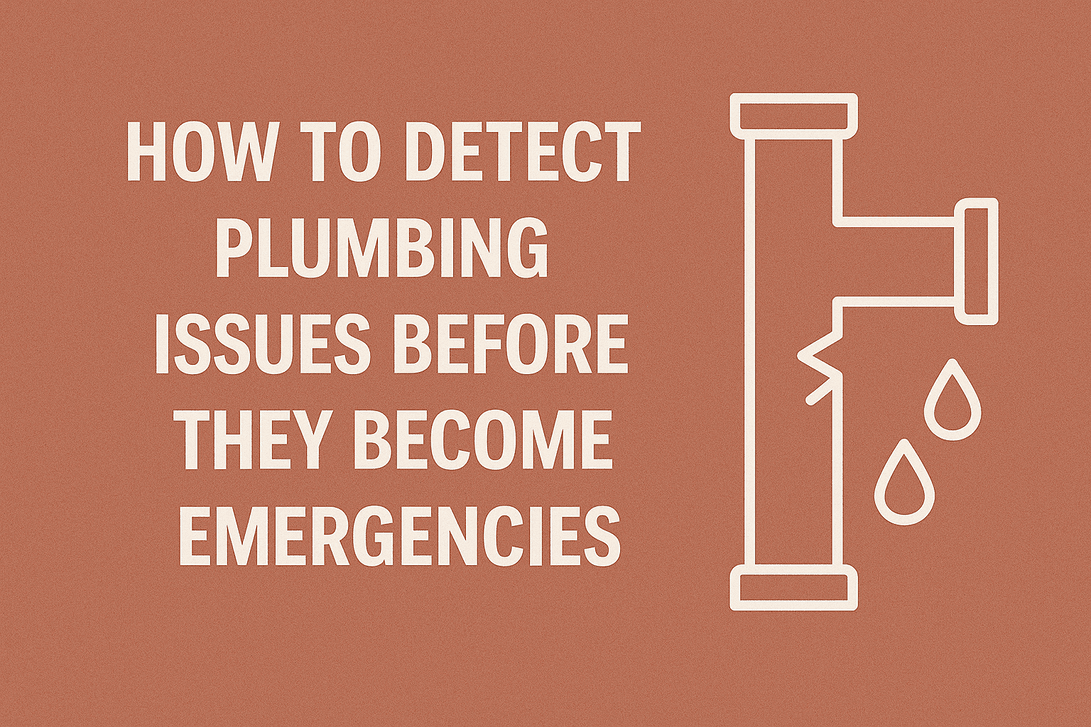Plumbing problems can escalate quickly from minor inconveniences to costly disasters. Detecting issues early is the key to protecting your home, saving money, and avoiding stressful emergencies. This guide explores the most common signs of plumbing trouble, preventative maintenance strategies, and professional tips that can help you safeguard your property before small leaks turn into major crises.
Why Early Plumbing Detection Matters
When it comes to plumbing, early detection saves thousands of dollars in potential damage. A tiny leak left unattended can damage flooring, drywall, and foundations. Worse, hidden water problems can encourage mold growth, which can compromise both structural integrity and indoor air quality.
Common Signs of Plumbing Issues
1. Unusual Noises in Pipes
- Banging or knocking may signal trapped air or water hammer.
- Whistling or hissing sounds often indicate a partially closed valve or high water pressure.
2. Slow Draining Fixtures
- Water pooling in sinks, tubs, or showers usually means a partial clog.
- Multiple slow drains at once may point to a main sewer line blockage, a serious issue that requires immediate professional help.
3. Fluctuating Water Pressure
- Inconsistent water pressure could result from hidden leaks, corroded pipes, or sediment buildup.
- Sudden drops in pressure may indicate a pipe rupture.
4. Discolored Water
- Brown or rusty water suggests pipe corrosion or sediment in the water heater.
- Green or blue water may be a sign of copper pipe corrosion.
5. Persistent Dripping
- Even minor faucet drips waste gallons of water and signal worn washers or seals.
- Continuous dripping in toilets can quietly raise your water bill significantly.
6. Damp Spots and Water Stains
- Dark patches on walls, ceilings, or floors are a red flag for hidden leaks.
- Warped flooring or bubbling paint is another warning sign.
How to Check for Hidden Plumbing Problems
Monitor Your Water Bill
A sudden spike in usage, even without noticeable leaks, may indicate a hidden underground or wall leak.
Test Your Toilet for Silent Leaks
Add a few drops of food coloring into the tank. If color appears in the bowl without flushing, water is leaking into the toilet.
Inspect Water Heater Performance
- Rumbling noises can mean sediment buildup.
- Inconsistent hot water delivery might indicate failing components or tank corrosion.
Look at Your Yard
Unexpected soggy patches, lush grass spots, or sinkholes may point to a broken underground pipe or sewer leak.
Preventative Maintenance Tips
Schedule Routine Inspections
Annual plumbing inspections help catch corrosion, leaks, and faulty components before they escalate.
Install Leak Detectors
Smart leak detectors placed under sinks, near water heaters, and by appliances can send instant alerts when water is detected.
Maintain Drains
- Avoid pouring grease or coffee grounds into sinks.
- Use strainers in showers and sinks to prevent hair or debris buildup.
Protect Pipes in Winter
- Insulate exposed pipes to prevent freezing.
- Allow faucets to drip slightly during extreme cold to relieve pressure buildup.
Plumbing Emergencies You Can Prevent
Burst Pipes
Freezing and excessive pressure are the main causes of burst pipes. Insulation and pressure regulation reduce this risk.
Sewer Backups
Tree root intrusion, clogs, or broken lines can cause sewer water to flow back into your home. Early detection of slow drains and foul odors can stop this disaster.
Flooded Basements
A failed sump pump or unnoticed leak can flood your basement. Regular pump testing and backup battery installation are key safeguards.
When to Call a Professional Plumber
Some issues are DIY-friendly, like unclogging minor drains or replacing faucet washers. However, call a licensed plumber immediately if you notice:
- Sudden water pressure loss.
- Signs of mold growth.
- Sewer odors indoors.
- Water pooling around your foundation.
Professional plumbers use advanced tools like video pipe inspections, leak detection equipment, and pressure testing to diagnose problems invisible to the untrained eye.
Long-Term Benefits of Early Detection
By investing in regular plumbing maintenance and acting at the first sign of trouble, homeowners enjoy:
- Lower utility bills from reduced water waste.
- Extended lifespan of plumbing systems.
- Protection of property value by preventing costly structural repairs.
- Peace of mind knowing your home is safe from sudden plumbing disasters.
Conclusion
Plumbing emergencies rarely strike without warning. By staying alert to early warning signs like strange noises, water stains, or fluctuating pressure, you can take swift action before problems worsen. Preventative maintenance and professional inspections are your best defense against expensive repairs and property damage.
Protect your home today, and you’ll avoid tomorrow’s emergencies.

